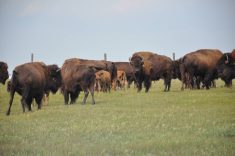FERINTOSH, Alta. – When Jeff Olsen received his 1992 final GRIP payment he was expecting a cheque for $10,500. He got $40.
He and his neighbor Bob Klassen of Ferintosh won’t accept such a shortfall and say Alberta Hail and Crop Insurance, which handles the Gross Revenue Insurance Plan, is in breach of contract because they are still owed money.
They are not alone. Ron Leonhardt of Unifarm said the estimated shortfall in the final wheat payments in Alberta in 1992 is $19 million. There may also be an overpayment for other commodities of $5 million.
Read Also

Canadian Food Inspection Agency slammed for handling of bovine tuberculosis case
The federal government leans heavily on producers to “take one for the team” and risk their livelihoods without any reassurance of support.
Groups like Unifarm and the Alberta Soft Wheat Producers Commission are talking with farmers who did not get the target revenue they were promised when they signed their GRIP contracts in 1992.
Discussion meeting set
They will meet March 23 with the board of directors that administers GRIP to discuss the shortfall. With a high percentage of the Alberta wheat crop grading feed due to frost in the fall of 1992, producers hoped GRIP would make up for the income loss.
In a letter to minister of agriculture Walter Paszkowski, Olsen and Klassen said the problem occurs with the 1992 program where the wrong grade factors are used to determine how the payment is triggered. They said there is a deficiency in the estimated final payment on feed wheat for 1992. Producers couldn’t reach the target revenue for which they were insured, even if they sold the grain for the prairie average price, they said.
Bob Splane, manager of Alberta Financial Services Corp. which administers the GRIP program, said the target revenue that is established when people pay their premiums is based on prices from the National Grains Bureau in late September. As long as those prices remain close, there is no problem. The problem occurred for the 1992-93 crop year when the prices between the feed grade and No. 2 spread considerably.
Dwight Dibbin, assistant to the agriculture minister, said if adjustments were to be made on GRIP they couldn’t be done on one commodity. All would have to be adjusted and he doesn’t think adjustments could be made retroactively.
Klassen disagrees, saying the problem is not interim payments but the final payments received by Alberta farmers in 1994.
“What would be required is not retroactive but an adjustment correcting the error made,” he said.
Farmers estimated their final payment according to the target revenue they expected on wheat when they signed their contracts.
For further information about the program call 1-800-396-0215.















